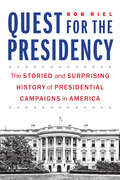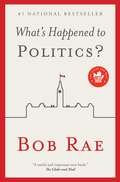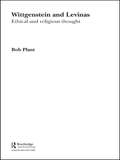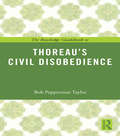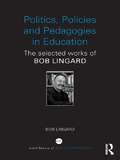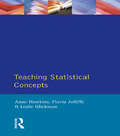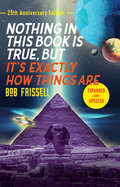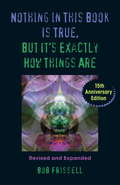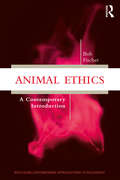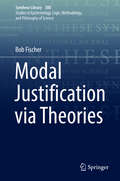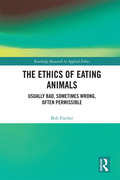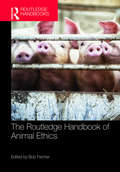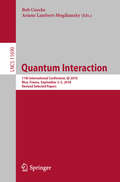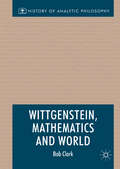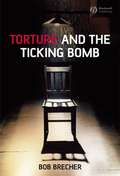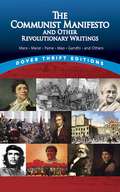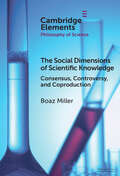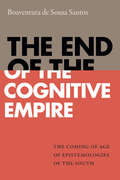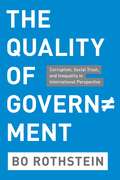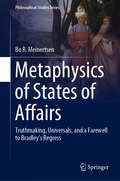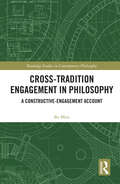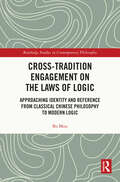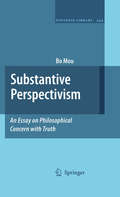- Table View
- List View
Quest for the Presidency: The Storied and Surprising History of Presidential Campaigns in America
by Bob RielQuest for the Presidency gathers in a single volume the compelling stories behind every presidential campaign in American history, from 1789 through 2020. Bob Riel takes us inside the 1800 clash between Thomas Jefferson and John Adams, the 1860 election that launched the Civil War, the 1948 whistle-stop comeback of Harry Truman, the Kennedy-Nixon drama of 1960, the 1980 Reagan Revolution, the historic 2008 election of Barack Obama, the turbulent 2020 battle between Joe Biden and Donald Trump, and everything in between. This engaging and insightful book includes a trove of entertaining stories about campaigns and candidates, and it goes beyond the campaign tales to also consider the threads that link elections across time. It sheds light on the continually evolving story of American democracy in a way that helps us to better understand present-day politics.
What's Happened to Politics?
by Bob RaeFrom esteemed Canadian political leader Bob Rae comes a piercing examination of the fractured state of Canadian politics and what can be done to fix it.Segmented electorates. Endless repetition of sound bites and vanity videos with little substance. Billions of dollars spent on lobbying. It's clear that Canadian politics is in a bad state. Through increasingly low voter turnouts and a general lack of engagement in the political process, Canadians have shown that they are dissatisfied and fed up with present-day politics. In What's Happened to Politics?, Canadians finally get an definitive account of the problems plaguing their national politics. Touching on everything from polling to issues of social justice to the way in which political parties package their candidates, Rae identifies the shortcomings of the current Canadian political framework, and what we, as citizens, can do to remedy that. With remarkable insight and startling accuracy, Rae speaks as the voice of reason as he imagines a political forum where citizens are inspired to participate instead of feeling disenfranchised. Filled with real-world examples and told from the point of view of an experienced statesman, What's Happened to Politics? is necessary reading for every Canadian, regardless of their political affiliation. Erudite, engaged, and keenly attuned to the frustrations expressed by Canadians across the political spectrum, Rae shows why he is the leading voice on Canadian politics.
Wittgenstein and Levinas: Ethical and Religious Thought (Routledge Studies in Twentieth-Century Philosophy #24)
by Bob PlantWittgenstein and Levinas examines the oft-neglected relationship between the philosophies of two of the most important and notoriously difficult thinkers of the twentieth century. By bringing the work of each philosopher to bear upon the other, Plant navigates between the antagonistic intellectual traditions that they helped to share. The central focus on the book is the complex yet illuminating interplay between a number of ethical-religious themes in both Wittgenstein's mature thinking and Levinas's distinctive account of ethical responsibility.
The Routledge Guidebook to Thoreau's Civil Disobedience (The Routledge Guides to the Great Books)
by Bob Pepperman TaylorSince its publication in 1849, Henry David Thoreau’s Civil Disobedience has influenced protestors, activists and political thinkers all over the world. Including the full text of Thoreau’s essay, The Routledge Guidebook to Thoreau’s Civil Disobedience explores the context of his writing, analyses different interpretations of the text and considers how posthumous edits to Civil Disobedience have altered its intended meaning. It introduces the reader to: the context of Thoreau’s work and the background to his writing the significance of the references and allusions the contemporary reception of Thoreau’s essay the ongoing relevance of the work and a discussion of different perspectives on the work. Providing a detailed analysis which closely examines Thoreau’s original work, this is an essential introduction for students of politics, philosophy and history, and all those seeking a full appreciation of this classic work.
Politics, Policies and Pedagogies in Education: The selected works of Bob Lingard
by Bob LingardIn the World Library of Educationalists, international experts compile career long collections of what they judge to be their finest pieces of work – extracts from books, key articles, salient research findings, major theoretical and practical contributions – so the world can read them in a single manageable volume. Readers will be able to follow the themes and strands and see how their work contributes to the development of the field. Bob Lingard has spent the last 30 years researching and writing in universities in Australia, England and Scotland about changing education policy issues. His work is written from a sociological perspective and with a commitment to social justice. He is the co-editor and co-author of 17 books and more than 100 journal articles and book chapters. In Politics, Policies and Pedagogies in Education, Bob Lingard provides critical sociological engagement with the politics of education. The focus is education policy and the impact of globalization, including epistemological and methodological issues necessary for researching education policy today. Topics analyzed include: educational restructuring new accountabilities and testing mediatization of education policy policy as numbers the global policy field and policy borrowing pedagogies. Lingard also considers the nature of educational research today. He has selected 12 of his key writings and in a critical introduction situates and contextualizes the work against key developments in the field and in the changing world.
Teaching as Communication (Effective Teacher, The)
by Bob HodgeGood teaching relies on a firm grasp of the communication process. In this innovative text Bob Hodge presents common pitfalls in the communication of teachers, and shows where they are most likely to mistake the communication of pupils. He uses practical examples which enable the reader to see an immediate and direct connection with classroom practises, making principles easier to understand and apply.
Nothing in This Book Is True, But It's Exactly How Things Are, 25th Anniversary Edition: The Esoteric Meaning Of The Monuments On Mars
by Bob FrissellThe twenty-fifth anniversary edition of this underground classic explores higher consciousness, human evolution, metaphysics, sacred geometry, the secret government, and moreNothing in This Book Is True, But It’s Exactly How Things Are details from a big-picture perspective the enormous infusion of higher dimensional energy that is dramatically raising the vibratory rate of the planet and everyone on it. Bob Frissell has greatly expanded upon the previous edition by including ten completely new chapters. Frissell also gives the details of the personal transformation that we must make if we are to survive and thrive, so we can “catch the ride” into higher consciousness in a way that enables Mother Earth to reach critical mass and become “lit from within.” This is the story of nothing less than the birth of a new humanity and the cocreation of Heaven on Earth.
Nothing in This Book Is True, But It's Exactly How Things Are: 15th Anniversary Edition
by Bob FrissellA personal psycho-spiritual journey, this book is a revised and expanded edition of a cult classic popular among fans of metaphysical literature. Photos illustrations throughout.
Animal Ethics: A Contemporary Introduction (Routledge Contemporary Introductions to Philosophy)
by Bob FischerThere are many introductions to the animal ethics literature. There aren’t many introductions to the practice of doing animal ethics. Bob Fischer’s Animal Ethics: A Contemporary Introduction fills that gap, offering an accessible model of how animal ethics can be done today. The book takes up classic issues, such as the ethics of eating meat and experimenting on animals, but tackles them in an empirically informed and nuanced way. It also covers a range of relatively neglected issues in animal ethics, such as the possibility of insect sentience and the ethics of dealing with pests. Finally, the book doesn’t assess every current practice using standard ethical theories, but tries to evaluate some of them using the moral frameworks endorsed by those involved. So, for instance, there is a chapter on the way that animal care and use committees try to justify some of the educational uses of animals, and the chapter on zoos considers the way that international zoological societies justify compromising animal welfare. The book wraps up with a discussion of the future of animal ethics. Each chapter opens with a helpful initial overview of the chapter and ends with a list of suggested readings to help students go further on their own. Key Features Covers animal ethics from an empirically informed perspective, bringing philosophy into conversation with key issues in animal science, conservation biology, economics, ethology, and legal studies, among other fields Provides ample coverage of the most salient current topics, including, for example: Debates about which animals are sentient The suffering of wild animals Research ethics The boundaries of activism Avoids suggesting that animal ethics is simply the practice of applying the right general theory to a problem, instead allowing readers to first work out the specific costs and benefits of making ethical decisions Impresses upon the reader the need for her to work out for herself the best way forward with difficult ethical issues, suggesting that progress can indeed be made Includes summaries and recommended readings at the end of each chapter
Modal Justification via Theories
by Bob FischerThis monograph articulates and defends a theory-based epistemology of modality (TEM). According to TEM, someone justifiably believe an interesting modal claim if and only if (a) she justifiably believes a theory according to which that claim is true, (b) she believes that claim on the basis of that theory, and (c) she has no defeaters for her belief in that claim. The book has two parts. In the first, the author motivates TEM, sets out the view in detail, and defends it against a number of objections. In the second, the author considers whether TEM is worth accepting. To argue that it is, the author sets out criteria for choosing between modal epistemologies, concluding that TEM has a number of important virtues. However, the author also concedes that TEM is cautious: it probably implies that we are not justified in believing some interesting modal claims that we might take ourselves to be justified in believing. This raises a question about TEM's relationship to Peter van Inwagen's modal skepticism, which the author explores in detail. As it turns out, TEM offers a better route to modal skepticism than the one that van Inwagen provides. But rather than being a liability, the author argues that this is a further advantage of the view. Moreover, he argues that other popular modal epistemologies do not fare better: they cannot easily secure more extensive modal justification than TEM. The book concludes by clarifying TEM's relationship to the other modal epistemologies on offer, contending that TEM need not be a rival to those views, but can instead be a supplement to them.
The Ethics of Eating Animals: Usually Bad, Sometimes Wrong, Often Permissible (Routledge Research in Applied Ethics)
by Bob FischerIntensive animal agriculture wrongs many, many animals. Philosophers have argued, on this basis, that most people in wealthy Western contexts are morally obligated to avoid animal products. This book explains why the author thinks that’s mistaken. He reaches this negative conclusion by contending that the major arguments for veganism fail: they don’t establish the right sort of connection between producing and eating animal-based foods. Moreover, if they didn’t have this problem, then they would have other ones: we wouldn’t be obliged to abstain from all animal products, but to eat strange things instead—e.g., roadkill, insects, and things left in dumpsters. On his view, although we have a collective obligation not to farm animals, there is no specific diet that most individuals ought to have. Nevertheless, he does think that some people are obligated to be vegans, but that’s because they’ve joined a movement, or formed a practical identity, that requires that sacrifice. This book argues that there are good reasons to make such a move, albeit not ones strong enough to show that everyone must do likewise.
The Routledge Handbook of Animal Ethics (Routledge Handbooks in Applied Ethics)
by Bob FischerThere isn’t one conversation about animal ethics. Instead, there are several important ones that are scattered across many disciplines.This volume both surveys the field of animal ethics and draws professional philosophers, graduate students, and undergraduates more deeply into the discussions that are happening outside of philosophy departments. To that end, the volume contains more nonphilosophers than philosophers, explicitly inviting scholars from other fields—such as animal science, ecology, economics, psychology, law, environmental science, and applied biology, among others—to bring their own disciplinary resources to bear on matters that affect animals. The Routledge Handbook of Animal Ethics is composed of 44 chapters, all appearing in print here for the first time, and organized into the following six sections: I. Thinking About Animals II. Animal Agriculture and Hunting III. Animal Research and Genetic Engineering IV. Companion Animals V. Wild Animals: Conservation, Management, and Ethics VI. Animal Activism The chapters are brief, and they have been written in a way that is accessible to serious undergraduate students, regardless of their field of study. The volume covers everything from animal cognition to the state of current fisheries, from genetic modification to intersection animal activism. It is a resource designed for anyone interested in the moral issues that emerge from human interactions with animals.
What Do We Owe Other Animals?: A Debate (Little Debates about Big Questions)
by Bob Fischer Anja JauernigPhilosophers Bob Fischer and Anja Jauernig agree that human society often treats animals in indefensible ways and that all animals morally matter; they disagree on whether humans and animals morally matter equally. In What Do We Owe Other Animals?: A Debate, Fischer and Jauernig square off over this central question in animal ethics. Jauernig defends the view that all living beings morally matter equally and are owed compassion, on account of which we are also obligated to adopt a vegan diet. Fischer denies that we have an obligation to become vegans, and argues for the position that humans morally matter more than all other living creatures. The two authors each offer a clear, well-developed opening statement, a direct response to the other’s statement, and then a response to the other’s response. Along the way, they explore central questions, like: What kind of beings matter morally? What kind of obligations do we have towards other animals? How demanding can we reasonably expect these obligations to be? Do our individual consumer choices, such as the choice to purchase factory-farmed animal products, make a difference to the wellbeing of animals? The debate is helpfully framed by introductions and conclusions to each of the major parts and by smaller introductions to each of the sub-sections. A Foreword by Dustin Crummett sets the context for the debate within a larger discussion of sentience, moral standing, reason-guided compassion, and the larger field of animal ethics. Key Features • Showcases the presentation and defense of two points of view on the moral worth of non-human animals• Provides frequent summaries of previously covered material• Includes a topically-organized list of Further Readings and a Glossary of all specialized vocabulary
PICTURING QUANTUM PROCESSES: A First Course in Quantum Theory and Diagrammatic Reasoning
by Bob Coecke Aleks KissingerThe unique features of the quantum world are explained in this book through the language of diagrams, setting out an innovative visual method for presenting complex theories. Requiring only basic mathematical literacy, this book employs a unique formalism that builds an intuitive understanding of quantum features while eliminating the need for complex calculations. This entirely diagrammatic presentation of quantum theory represents the culmination of ten years of research, uniting classical techniques in linear algebra and Hilbert spaces with cutting-edge developments in quantum computation and foundations. Written in an entertaining and user-friendly style and including more than one hundred exercises, this book is an ideal first course in quantum theory, foundations, and computation for students from undergraduate to PhD level, as well as an opportunity for researchers from a broad range of fields, from physics to biology, linguistics, and cognitive science, to discover a new set of tools for studying processes and interaction.
Quantum Interaction: 11th International Conference, QI 2018, Nice, France, September 3–5, 2018, Revised Selected Papers (Lecture Notes in Computer Science #11690)
by Bob Coecke Ariane Lambert-MogilianskyThis book constitutes the thoroughly refereed post-conference proceedings of the 10th International Conference on Quantum Interaction, QI 2018, held in Nice, France, in September 2018.The 12 papers presented in this book were carefully reviewed and selected from 15 submissions. The papers address topics such as: psychology, economics, semantic and memory, natural language processing, cognition, information retrieval, biology, and political science.
Wittgenstein, Mathematics and World (History of Analytic Philosophy)
by Bob ClarkThis book uses Ludwig Wittgenstein's philosophical methodology to solve a problem that has perplexed thinkers for thousands of years: 'how come (abstract) mathematics applies so wonderfully well to the (concrete, physical) world?' The book is distinctive in several ways. First, it gives the reader a route into understanding important features of Wittgenstein's writings and lectures by using his methodology to tackle this long-standing and seemingly intractable philosophical problem. More than this, though, it offers an outline of important (sometimes little-known) aspects of the development of mathematical thought through the ages, and an engagement of Wittgenstein's philosophy with this and with contemporary philosophy of mathematics on its own terms. A clear overview of all this in the context of Wittgenstein's philosophy of mathematics is interesting in its own right; it is also just what is needed to solve the problem of mathematics and world.
Torture and the Ticking Bomb (Blackwell Public Philosophy Series)
by Bob BrecherThis timely and passionate book is the first to address itself to Harvard Law Professor Alan Dershowitz’s controversial arguments for the limited use of interrogational torture and its legalisation. Argues that the respectability Dershowitz's arguments confer on the view that torture is a legitimate weapon in the war on terror needs urgently to be countered Takes on the advocates of torture on their own utilitarian grounds Timely and passionately written, in an accessible, jargon-free style Forms part of the provocative and timely Blackwell Public Philosophy series
The Communist Manifesto and Other Revolutionary Writings: Marx, Marat, Paine, Mao Tse-Tung, Gandhi and Others (Dover Thrift Editions)
by Bob BlaisdellThis concise anthology presents a broad selection of writings by the world's leading revolutionary figures. Spanning three centuries, the works include such milestone documents as the Declaration of Independence (1776), the Declaration of the Rights of Man (1789), and the Communist Manifesto (1848). It also features writings by the Russian revolutionaries Lenin and Trotsky; Marat and Danton of the French Revolution; and selections by Jean-Jacques Rousseau, Emma Goldman, Mohandas Gandhi, Mao Zedong, and other leading figures in revolutionary thought.An essential collection for anyone interested in the issues, ideas, and history of the major revolutions of modern times, this book will prove an enlightening companion to students of this genre. Includes a selection from the Common Core State Standards Initiative: The Declaration of Independence.
The Social Dimensions of Scientific Knowledge: Consensus, Controversy, and Coproduction (Elements in the Philosophy of Science)
by Boaz MillerThis Element is about the social dimensions of scientific knowledge. The first section asks in what ways scientific knowledge is social. The second section develops a conception of scientific knowledge that accommodates the insights of the first section, and is consonant with mainstream thinking about knowledge in analytic epistemology. The third section asks under what conditions we can tell, in the real world, that a consensus in a scientific community amounts to shared scientific knowledge, as characterized in the second section, and how to deal with scientific dissent. The fourth section reviews the ways epistemic and social elements mutually interact to coproduce scientific knowledge. This Element engages with literature from philosophy of science and social epistemology, especially social epistemology of science, as well as Science, Technology, and Society (STS), and analytic epistemology. The Element focuses on themes and debates that date from the start of the second millennium.
The End of the Cognitive Empire: The Coming of Age of Epistemologies of the South
by Boaventura De SantosIn The End of the Cognitive Empire Boaventura de Sousa Santos further develops his concept of the "epistemologies of the South," in which he outlines a theoretical, methodological, and pedagogical framework for challenging the dominance of Eurocentric thought. As a collection of knowledges born of and anchored in the experiences of marginalized peoples who actively resist capitalism, colonialism, and patriarchy, epistemologies of the South represent those forms of knowledge that are generally discredited, erased, and ignored by dominant cultures of the global North. Noting the declining efficacy of established social and political solutions to combat inequality and discrimination, Santos suggests that global justice can only come about through an epistemological shift that guarantees cognitive justice. Such a shift would create new, alternative strategies for political mobilization and activism and give oppressed social groups the means through which to represent the world as their own and in their own terms.
The Quality of Government: Corruption, Social Trust, and Inequality in International Perspective
by Bo RothsteinThe relationship between government, virtue, and wealth has held a special fascination since Aristotle, and the importance of each frames policy debates today in both developed and developing countries. While it's clear that low-quality government institutions have tremendous negative effects on the health and wealth of societies, the criteria for good governance remain far from clear. In this pathbreaking book, leading political scientist Bo Rothstein provides a theoretical foundation for empirical analysis on the connection between the quality of government and important economic, political, and social outcomes. Focusing on the effects of government policies, he argues that unpredictable actions constitute a severe impediment to economic growth and development--and that a basic characteristic of quality government is impartiality in the exercise of power. This is borne out by cross-sectional analyses, experimental studies, and in-depth historical investigations. Timely and topical, The Quality of Government tackles such issues as political legitimacy, social capital, and corruption.
Metaphysics of States of Affairs: Truthmaking, Universals, and a Farewell to Bradley’s Regress (Philosophical Studies Series #136)
by Bo R. MeinertsenThis book addresses the metaphysics of Armstrongian states of affairs, i.e. instantiations of naturalist universals by particulars. The author argues that states of affairs are the best candidate for truthmakers and, in the spirit of logical atomism, that we need no molecular truthmakers for positive truths. In the book's context, this has the pleasing result that there are no molecular states of affairs. Following this account of truthmaking, the author first shows that the particulars in (first-order) states of affairs are bare particulars. He then argues that the properties in states of affairs are simple, non-relational and concrete universals. Next, he argues that (material) relations in states of affairs are external relations. Lastly, he argues that a state of affairs is unified by a distinctive formal relation without giving rise to Bradley’s regress. Written in a relatively non-technical style, the book offers a valuable resource for philosophers working on analytic metaphysics and ontology, as well as their graduate students.
Cross-Tradition Engagement in Philosophy: A Constructive-Engagement Account (Routledge Studies in Contemporary Philosophy)
by Bo MouThis book presents a systematic unifying-pluralist account—a "constructive-engagement" account—of how cross-tradition engagement in philosophy is possible. The goal of this "constructive-engagement" account is, by way of reflective criticism, argumentation, and methodological guiding principles, to inquire into how distinct approaches from different philosophical traditions can talk to and learn from each other for the sake of making joint contributions to the contemporary development of philosophy. In Part I of the book, Bo Mou explores a range of fundamental theoretic and methodological issues in cross-tradition philosophical engagement and philosophical interpretation. In Part II, he analyzes several representative case studies that demonstrate how relevant resources in the Western and Chinese philosophical traditions can constructively engage with each other. These studies cover issues in philosophical methodology, metaphysics, epistemology, philosophy of language and logic, and ethics. The book’s theoretical and practical approaches expand the vision, coverage, and agenda of doing philosophy comparatively, and promote worldwide joint efforts of cross-tradition philosophical inquiries. Cross-Tradition Engagement in Philosophy will be of interest to graduate students and scholars interested in comparative philosophy and the intersection of Chinese and Western philosophy. It will also appeal to those who are interested in the ways in which cross-tradition philosophical engagement can enhance contemporary philosophical debates in metaphysics, epistemology, philosophy of language and logic, and ethics.
Cross-Tradition Engagement on the Laws of Logic: Approaching Identity and Reference from Classical Chinese Philosophy to Modern Logic (Routledge Studies in Contemporary Philosophy)
by Bo MouThis book demonstrates how, through cross-tradition engagement, insights and engaging treatments from the Chinese philosophical tradition can work with relevant resources from modern logic and contemporary philosophy to enhance our understanding of two basic principles of logic: the law of identity and the law of non-contradiction.The law of identity and the law of non-contradiction are widely accepted principles in logic and other intellectual pursuits. However, there are disagreements as to how to understand and treat the genuine structures and contents of these two basic principles. This book provides a holistic inquiry into these principles for the sake of enhancing our understanding and treatment of them from the vantage point of cross-tradition engagement. It begins by offering a philosophical interpretation of three classical texts in Chinese philosophy in their respective contexts: the “Bai-Ma-Lun” in Gongsun Long’s texts, the “Xiao-Qu” in the Later Mohist texts, and Lao Zi’s Dao-De-Jing in classical Daoism. The author explains an innovative dual-track characterization of relative identity that is informed by relevant resources from these texts as well as Western philosophical traditions. He shows how this cross-tradition engaging approach can make constructive and significant contributions to the jointly concerned fundamental issues of identity and reference in logic, philosophy of logic and language, metaphysics, as well as philosophy more generally. Cross-Tradition Engagement on the Laws of Logic will appeal to scholars and advanced students working in philosophy of logic, philosophy of language, Chinese philosophy, and comparative philosophy.
Substantive Perspectivism: An Essay on Philosophical Concern with Truth
by Bo MouThis book is an inquiry into the philosophical concern with truth as one joint subject in philosophy of language and metaphysics and presents a theory of truth, substantive perspectivism (SP). Emphasizing our basic pre-theoretic understanding of truth (i.e., what is captured by the axiomatic thesis of truth that the nature of truth consists in capturing the way things are), and in the deflationism vs. substantivism debate background, SP argues for the substantive nature of non-linguistic truth and its notion's indispensable substantive explanatory role, both of which are not only intrinsically beyond what the linguistic function of the truth predicate can tell but are fundamentally related to the raison d'être of the truth predicate. Taking a holistic approach, SP endeavors to do justice to various reasonable perspectives, which are somehow contained in many competing accounts of truth, through a coordinate system: SP interprets such perspectives as distinct but related perspective-elaboration principles that distinctively (regarding distinct dimensions of the truth concern and/or for the sake of distinct purposes) elaborate, but are also unified by, the truth axiom thesis. To look at the issue from a broader vision, the book also takes a cross-tradition approach exploring the relationship between Daoist thinking of truth and thinking about truth in analytic philosophy. This book will enhance our systematic understanding of the issue through its holistic approach, broaden our vision on the issue via its cross-tradition approach, and enrich the conceptual and explanatory resources in treating the issue.
